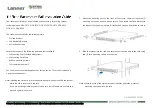
Expansion Bus Arbitration
8-45
Expansion Bus
Figure 8–25. Timing Diagrams for Bus Arbitration–XHOLD/XHOLDA
(Internal Bus Arbiter Enabled).
OUTPUTS
XHOLD(input)
XHOLDA(output)
External Device Mastering the Bus
8.6.2
Internal Bus Arbiter Disabled
In this mode, the ‘C6202 acts as slave on the expansion bus by default. This
mode is preferred if the ‘C6202 is interfacing to an external host, or if multiple
‘C6202 are connected to a PCI interface chip.
When the ’C6202 owns the expansion bus, both XHOLD (output) and
XHOLDA (input) are high. To request the expansion bus (for example to
access a FIFO) the ‘C6202 asserts XHOLD. The external expansion bus
arbiter asserts XHOLDA when control is granted. The expansion bus should
not be granted to the ’C6202 unless requested by XHOLD.
Figure 8–26 illustrates XHOLD and XHOLDA functionality in this mode.
Figure 8–26. Timing Diagrams for Bus Arbitration XHOLD/XHOLDA
(Internal Bus Arbiter Disabled)
OUTPUTS
XHOLD(output)
XHOLDA(input)
The ’C6202 is Master of the Bus
When the internal bus arbiter is disabled (XARB = ’0’) and the expansion bus
master transfer is initiated by writing to the start bit field of the XBHC register,
the DSP asserts its XHOLD request. If the host initiates a transfer to the DSP
instead of granting the DSP access to the expansion bus, the DSP drops its
XHOLD request, as shown in Figure 8–27.
The DSP drops the bus request only if the pending request is for a transfer to
the expansion bus host port. The DSP will reassert the bus request for pending
master transfers after the host completes its transfer (see Figure 8–27). For
more detail see Table 8–19.
















































